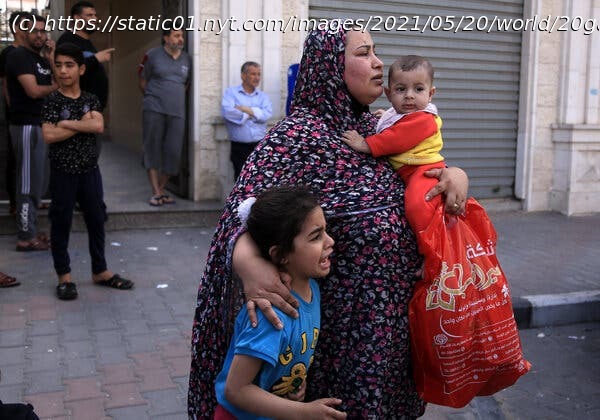Mr. Biden’s brief appearance in the East Room was quickly arranged after Hamas officials and the Israelis confirmed that they had agreed to a cease-fire mediated by Egypt.
The truce came into effect on Friday morning in the Middle East, after days of fighting that claimed hundreds of lives. A cease-fire took effect between Israel and Hamas. Biden says Israel and Hamas have agreed to a ‘mutual, unconditional’ cease-fire. International pressure for a cease-fire had been growing. On the ground: Visiting a mixed Arab-Jewish city recently rocked by mob violence. Past cease-fire periods between Israel and Hamas have not always held up. In Pictures: Scenes of conflict and destruction. On the ground: What Israelis are saying about the latest eruption of violence. In a flash, an unimaginable loss leaves two bloodied survivors in Gaza. A cease-fire between Israel and Hamas took effect early Friday morning, hours after both sides agreed to end more than 10 days of fighting that had claimed hundreds of lives. The truce, mediated by Egypt, began at 2 a.m. in Israel — 7 p.m. Thursday in the Eastern United States — as people on either side of the divide watched nervously to see whether it would hold. In Israel, Prime Minister Benjamin Netanyahu’s office announced on Thursday evening that his security cabinet had voted unanimously to accept the Egyptian proposal, and officials of Hamas, the militant group that controls Gaza, confirmed that it, too, had accepted. But each side cautioned that its compliance could depend on the other’s actions. In a broadcast address from the White House, President Biden lamented “the tragic deaths of so many civilians, including children,” and lauded Israeli and Egyptian officials. Noting that he had spoken with Mr. Netanyahu six times during the crisis, he said, “I commend him for the decision to bring the current hostilities to a close in less than 11 days.” He vowed to marshal international resource to rebuild Gaza, adding, “we will do this in full partnership with the Palestinian Authority — not Hamas, the Authority — in a manner that does not permit Hamas to restock its arsenal.” Since May 10, Hamas has fired rockets into Israel, and Israel has bombed targets in Gaza. Sirens sounded in Israeli towns bordering the Gaza Strip in the minutes after the Israeli announcement, indicating that militants were continuing to fire rockets as the cease-fire approached. There has been intensive mediation between Hamas and Israel, which do not talk to each other directly, by several nations, amid growing international pressure to stop the fighting, and both sides have said this week that they were open to a cease-fire. The Israeli aerial and artillery campaign has killed more than 230 people in Gaza, many of them civilians, and badly damaged the impoverished territory’s infrastructure, including the fresh water and sewer systems, the electrical grid, hospitals, schools and roads. The primary target has been Hamas’s extensive network of tunnels for moving fighters and munitions, and Israel has also sought to kill Hamas leaders and fighters. More than 4,000 rockets have been fired at Israel from Gaza since May 10, killing 12 people, mostly civilians. Mr. Netanyahu met on Thursday with his security cabinet to review how far the military had gone in damaging Hamas, including destroying its network of tunnels and its arsenal of rockets and launchers. He and other Israeli officials had insisted that the bombardment of Gaza would continue as long as it took to safeguard Israeli security. Diplomats from Egypt, Qatar, and the United Nations have mediated between the two sides. Hamas has never recognized Israel’s existence, and Israel considers Hamas a terrorist organization. The cease-fire announcement also followed behind-the-scenes pressure from the Biden administration. The United States has no contact with Hamas, which it and the European Union also consider a terrorist group, but the administration has nevertheless played an important role in efforts to end the conflict. It urged Mr. Netanyahu to agree to a cease-fire before international support for Israel evaporated, and it sent an envoy, Hady Amr, to meet in person with Israeli and Palestinian politicians this week. In a phone conversation on Wednesday, President Biden told Mr. Netanyahu that he “expected a significant de-escalation” in hostilities soon. Past cease-fires between Israel and Hamas have often fallen apart, including in 2014, when truces collapsed at least twice during a seven-week war. But the agreements can offer periods of calm to allow time for negotiating a longer-term deal. They also give civilians a chance to regroup and allow displaced people to return to their homes. Hamas and Israel have been engaged in some form of conflict since the Palestinian group was founded in the 1980s. This particular round of military action began as Hamas fired a barrage of rockets at Jerusalem in response to several police raids on the Aqsa Mosque, one of the holiest sites in Islam, and the planned evictions of several Palestinian families from their homes in the city. Even if the fighting pauses, its underlying causes remain: the battle over land rights in Jerusalem and the West Bank, religious tensions in the Old City of Jerusalem and the absence of a peace process to resolve the conflict. Gaza remains under a punishing blockade by Israel and Egypt. Although the conflict forged a rare moment of unity among Palestinians across the West Bank, Israel and Gaza, it remains unclear whether it will significantly alter their standing and sense of oppression. It also led to days of violent attacks within Israel by Arab and Jewish mobs, and highlighted decades of frustration among Arab citizens of Israel who account for about 20 percent of the population and face frequent discrimination. The damage caused by the war has not been spread proportionately. Hamas militants and their allies have fired thousands of rockets at Israel, most of which were intercepted by an Israeli antimissile defense systems or caused minimal damage. Those that hit Israel damaged several apartments, broke a gas pipeline and briefly paused operations at a gas rig and at two major Israeli airports. Israel’s airstrikes damaged 17 hospitals and clinics in Gaza, wrecked its only Covid-19 testing laboratory, and cut off fresh water, electricity and sewer service to much of the enclave, deepening a humanitarian crisis in the already crowded and impoverished territory. Dozens of schools in Gaza have been damaged or closed, and 72,000 Gazans have left their homes, mostly taking shelter in schools run by the United Nations. — Patrick Kingsley President Biden praised what he described as a “mutual unconditional” cease-fire between Israel and Hamas on Thursday, sending his condolences to “all the families, Israeli and Palestinian,” who endured some of the worst fighting the region has seen in years. “I believe the Palestinians and Israelis equally deserve to live safely and securely,” Mr. Biden said during brief remarks delivered at the White House, “and to enjoy equal measures of freedom, prosperity and democracy.” Mr. Biden’s appearance in the East Room was quickly arranged after Hamas and Israel confirmed that they had agreed to a cease-fire mediated by Egypt — a de facto intermediary since the two groups do not deal directly with each other — to begin on Friday morning. Mr. Biden did not answer questions from reporters about whether he believed the agreement to draw down the violence would hold. Earlier in the day, Prime Minister Benjamin Netanyahu of Israel had cautioned that “the reality on the ground will determine the continuation of the campaign.” In the hours before the cease-fire announcement, Mr. Biden held a call with Abdel Fattah el-Sisi, the Egyptian president, to discuss the possibility of brokering an end to more than 10 days of renewed violence between Hamas, the militant group that controls Gaza, and the Israelis. Mr. Biden had in recent days spoken six times, and on increasingly blunt terms, with Mr. Netanyahu, warning him that he could not withstand mounting international criticism of the Gaza strikes for long. In his remarks, Mr. Biden said he had also spoken with Mahmoud Abbas, the president of the Palestinian National Authority. The president’s advisers said he believed he could quietly push Mr. Netanyahu, whom he has known for 40 years, to bring an end to violence that has killed more than 230 people in Gaza and 12 in Israel, many of them civilians. But the cease-fire failed to materialize directly after their latest phone call on Wednesday, when Mr. Biden said he expected a significant de-escalation in violence that day. Amid mounting international pressure to find a resolution to the violence and direct appeals from progressive Democrats, White House officials on Thursday found themselves having to explain that Mr. Biden’s choice to speak carefully in public and forcefully in private had been the best approach. For his part, Mr. Biden on Thursday appeared eager to emphasize that “quiet, relentless diplomacy” had led to the cease-fire. “We have believed that they are in a position to start winding their operations down,” Jen Psaki, the White House press secretary, said, though the administration’s readout of a Wednesday call held by the two leaders had been framed with much more direct language. “And certainly that is what we’ve been conveying.” When asked why Mr. Biden had waited until Thursday to hold a call with Mr. Sisi, Ms. Psaki said that the administration’s approach to diplomacy “does not always require a call from a global leader.” Earlier in the day, Kamala Harris, the vice president, held a call with King Abdullah II of Jordan, to brief him “on our intensive diplomatic efforts to support the path to a cease-fire in Gaza,” she said in a tweet. Secretary of State Antony J. Blinken, speaking to reporters while on a trip to Greenland, said that he would be “prepared at any time to go to Israel” or to parts of the Middle East “if that would serve the purpose of moving beyond violence and helping to work on improving lives for Israelis and Palestinians alike.” “There’s a deep and shared concern around the world for the deaths of Palestinians and innocent Israelis, and that our goal continues to be to stop the violence, bring calm, and then get back to work, trying to build lasting stability and a more hopeful future,” Mr. Blinken said. — Katie Rogers and Michael Crowley As the humanitarian situation for the two million people living in the Gaza Strip grew more dire by the day, international pressure mounted to find a way to persuade Israel and Hamas to end a cycle of violence in which civilians are bearing a heavy cost. President Biden spoke with Prime Minister Benjamin Netanyahu of Israel on Wednesday, telling the Israeli leader that he “expected a significant de-escalation today on the path to a cease-fire,” administration officials said. On Thursday, Mr. Biden spoke with President Abdel Fattah el-Sisi of Egypt, whose nation has acted as an intermediary in the negotiations as neither the United States nor Israel deal directly with Hamas. And at a special meeting of the United Nations General Assembly, Secretary General António Guterres called for a halt to the bloodshed and destruction. “The fighting must stop immediately,” he said. “I appeal to all parties to cease hostilities, now and I reiterate my call on all sides for an immediate cease-fire.
Домой
United States
USA — Political Biden says Israel and Hamas have agreed to a ‘mutual, unconditional’ cease-fire.






